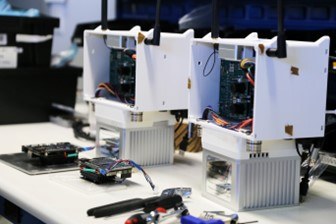Advancement of technology benefiting plant-based sector
- Posted:

All artificial intelligence projects (AI) start with a good idea, but a good idea will only get you so far. Just as important are the data you’ve collected or plan to collect, your employees’ skillsets, and whether the AI technology you plan to use is suitable for your organization's specific needs, can solve existing problems, or bring value to the company.
Dr. Lysa Porth, CEO of AIRM Consulting, has worked with AI technology for almost a decade. In that time, she’s seen AI progress from being a predictive analytics tool to becoming a more sophisticated technology that can detect hidden patterns to address a wider range of product development issues than before.
“Our roots are really from the actuarial side … and a lot of the focus over that period of time, was on what we now refer to as predictive analytics,” Porth said. “The, kind of, best practice had been looking backwards in time, and the assumption was that what’s happened historically was what we expect to happen in the future. And as we started to see implications from climate impacts and impacts from technology adoption and genetics and things like that, we started to see gaps where maybe what was happening, historically, wasn’t always what we were seeing in the future.”
Such significant advancement of AI technology has been a boon not only for consulting firms such as AIRM, but also for Canada’s plant-based sector and the country as a whole. Porth explained that while there are still challenges to solve related to AI and its use, it has potential to make Canada a leader in both agrifood and digital agriculture.
She explained that, through the use of AI, Canada can better track and, potentially, mitigate the climate impacts related to food production. Additionally, it can help optimize value chain's processes, from on-farm production through to food manufacturing.
An example of such technology is the Crop Sentry project that AIRM is currently working on. Used in fields to predict how a crop will grow throughout the season, Crop Sentry can help fill in data gaps that an agronomist may be unable to capture on scale. Knowing such information ahead of time can help farmers better treat their crops for diseases or pests, while increasing yield, improving sustainability metrics.
Porth said partnerships with farmers and agriculture companies were an important element to developing their AI technology. She sees this as a theme in most artificial intelligence technology development, right through to Canada’s overall opportunity in the area.
“If Canada can take a leadership position on the data that we collect, the partnerships that we have, our IOT solutions, our AI strength, that’s where we need to pull it all together,” she said.
With such wide-reaching potential for AI across the plant-based value chain, it can be tempting for companies to dive into working with pre-made pieces of technology. Porth, however, cautioned against this.
Instead, she recommends looking for more custom-made solutions to unique problems within your business. Modelling crop phenology is a complex dynamic that requires deep subject matter expertise and knowledge of AI technologies. It involves the integration of several sources of data with different spatial and temporal resolutions derived from different sensor technology. A considerable amount of effort goes into data preparation, and for some sensor data, such as that derived from LiDAR, which contributes to the Crop Sentry technology, state-of-the-art AI models are needed.
“You need to be thoughtful about how you’re building these AI algorithms. There’s a lot that goes into the pipeline before you get to the modelling part, such as ensuring data quality, data processing, and standardization in the ETL pipeline - which stands for extract, transform, load. All of these steps are critical for the success of the AI project,” she said.
Ensuring you’ve chosen the right AI technology solution comes down to a lot of factors, with data being one of the most important. Whether it’s related to collection, quality or processing, Porth explained that while gathering data is essential, it is not enough. Data classification and labeling is a time-consuming and complex process that requires significant expertise to ensure that datasets are accurately labeled, consistent and detailed enough to capture the real-world complexity, increasing the need for either skilled staff or a strategic partnership. The accuracy and completeness of the collected data can significantly impact the resulting AI model's accuracy and effectiveness.
Protein Industries Canada has a program that can help companies across Canada’s plant-based sector develop and adopt AI technology. To learn more about it, including how to apply, visit www.proteinindustriescanada.ca/artificial-intelligence.
To learn more about ARIM, visit www.airmconsulting.com.
